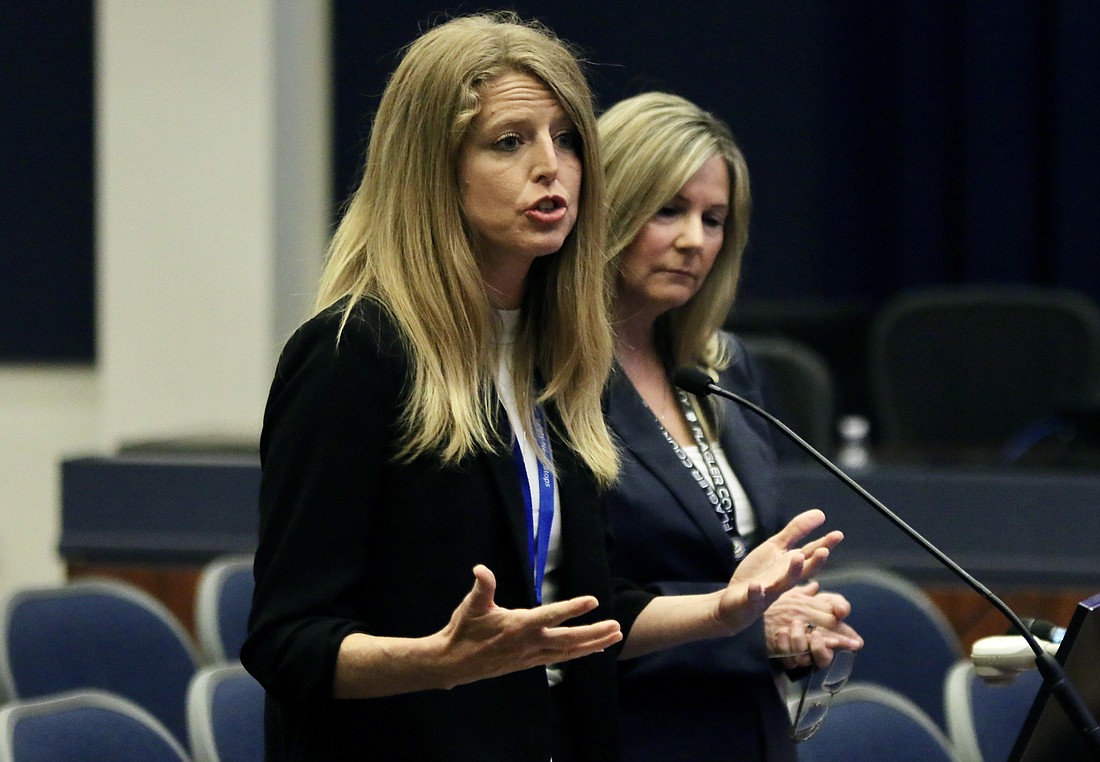- April 18, 2024
-
-
Loading

Loading

The Palm Coast City Council has decided not to apply for a grant that could bring public electric vehicle chargers to Palm Coast, even though electric vehicle chargers are part of a city Strategic Action Plan priority.
Chief Sustainability and Resiliency Officer Maeven Rogers presented an opportunity at a June 6 council meeting for Palm Coast to apply for a Florida Department of Transportation grant that would make EV charging stations publicly accessible.
Several council members had concerns about local demand for the stations and government involvement in private enterprise.
One of the City Council’s Strategic Action Plan priorities — which were unanimously approved at a May 2 City Council meeting — is to collaborate with community partners to “provide electric vehicle fast-charging stations across multiple locations in the city.”
The priority item also directs staff to explore ways to “add revenues for street improvements … through user fees for EV charging stations.”
Rogers said she specifically researched the grant because of that priority item and because of comments by City Council members about the need to find ways to earn revenue from EV charging stations.
Vice Mayor Ed Danko has suggested at several previous meetings that the city should look for ways to charge electric vehicle owners for road maintenance, similar to how gas vehicles pay a gas tax at the pump.
I don’t think we should compete with free enterprise. ... I just don't see us being a business like that."
— Ed Danko, Palm Coast vice mayor
But in terms of this grant, he said he had concerns about government getting involved in the private business sector, despite the grant coming from a Department of Transportation program.
“I don’t think we should compete with free enterprise,” Danko said. “I just don’t see us being a business like that.”
Danko said part of his concern is that the city government could potentially undercut private businesses like gas stations by offering charging stations.
If the council applied before the June 13 deadline and received the funds, the grant would cover 80% of the costs to install the chargers, with the city responsible for the remaining 20%. From there, the program would pay for the maintenance of the stations for the next five years.
The chargers would not be free to use, Rogers said, and the council would have had to determine the price at the electric pumps at a later date. Her proposal identified three locations for a total of 11 charging stations.
Since most residents have charging stations in their homes, Rogers said, these public stations would likely mainly be used for tourists or for residents who need a quick charge while out and about.
Ultimately, Mayor David Alfin said, there wasn’t enough data or time for him to feel comfortable approving an application.
Council member Theresa Carli Pontieri agreed. She said she had concerns that there was not a large enough demand to warrant spending taxpayer dollars on the energy costs.
We will get a return on investment, they will pay for themselves. How high that was wrong assessment is to be determined."
— Maeven Rogers, Palm Coast chief sustainability and resiliency officer
Rogers said that no matter what, the city would be able to break even on the costs.
“We will get a return on investment; they will pay for themselves,” she said. “How high ... of an investment is to be determined.”
Rogers said the council also had different options available to pay its 20% of the cost, including partnering with a private entity to cover the costs and splitting revenue later.
“These private [charging] companies are very excited about these opportunities,” Rogers said.
Council member Nick Klufas is the only member of the council that owns an electric vehicle. He pointed out that charging stations would be listed on maps for electric vehicle drivers looking for places to fill up.
“It’s just an underserved priority right now,” Klufas said.
Rogers was trying to form a coalition with the other local municipalities while applying for the grant. Rogers said they had approached the Flagler County Commission, Flagler County School District, Daytona State College, city of Flagler Beach and the city of Bunnell, with all but Flagler County showing interest in the application.
It's just an underserved priority right now."
— Nick Klufas, City Council member
Rogers and the county's Chief of Special Projects Holly Albanese approached the Flagler County Commission at its June 5 meeting to ask for the commission’s participation in the application and a letter of support. While the commission did ultimately agree to sign a letter of support in a 4-1 vote, it voted 3-2 against joining the application.
Commissioner David Sullivan, who voted against the letter and joining the application, had concerns similar to Danko’s. Sullivan said that if EV chargers become in demand the private sector would supply them, just as it does with gas stations.